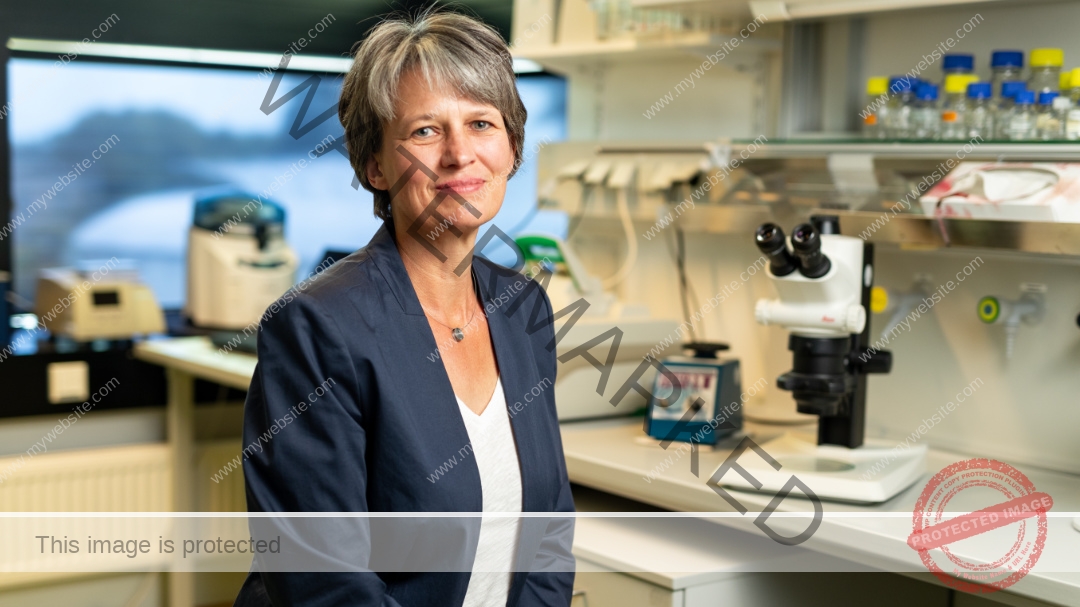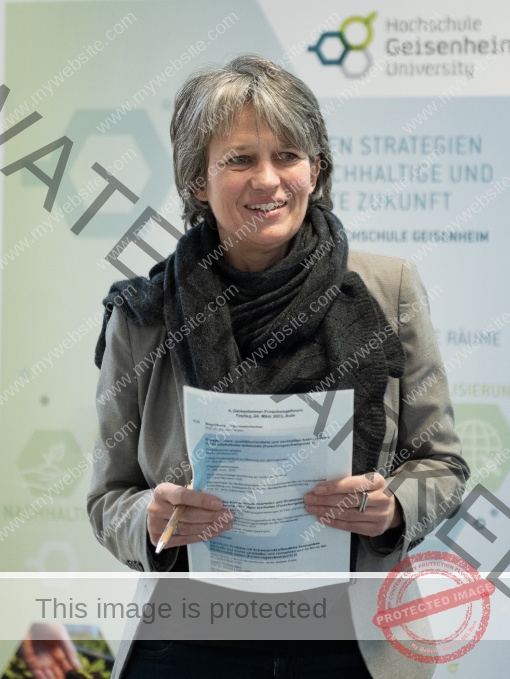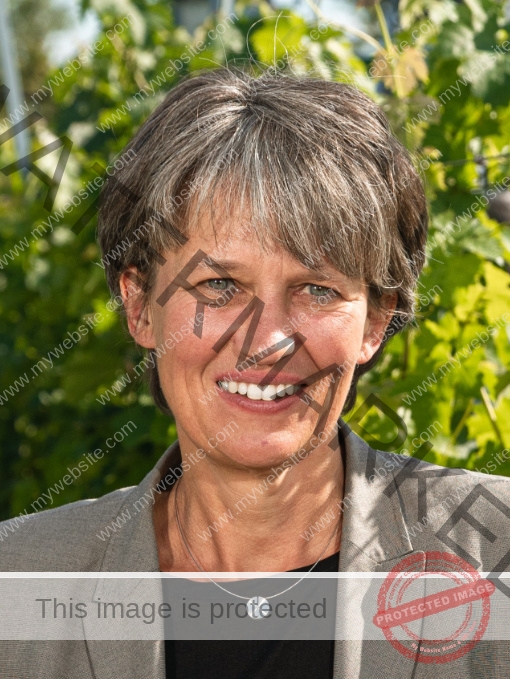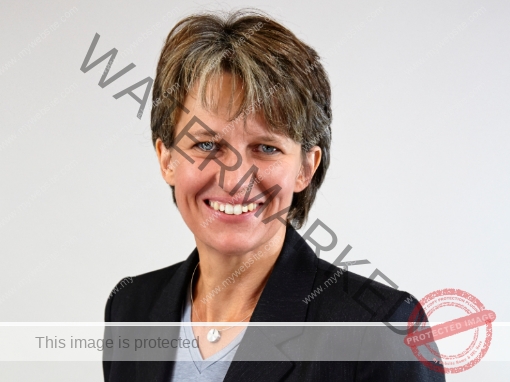Interview with Wrangell Fellow Professor Annette Reineke
From a garden greenhouse to phytomedicine
Annette Reineke is one of the first graduates of the Wrangell Fellowship. After studying agricultural science and earning a doctorate in phytomedicine, she became a Wrangell Fellow professor.
In the interview, she reports on her biggest challenges and how she was able to pursue a scientific career with small children.
“When I first heard about the profession of a phytomedician, I knew immediately that this is what I want to do.”
Annette Reineke
When did you discover your passion for science?
Even as a child, I was interested in plants and nature. When I was about 13 years old, my parents gave me a small greenhouse for our garden. There, I grew tomatoes and cucumbers and realized how much fun it was. Why do some plants grow better than others? What can I do against mildew or aphids? I asked myself such questions back then.
In school, I then chose biology as a major course. When we went to a career information center with the graduating class – there was no internet like today in the late 1980s – I heard about the profession of a phytomedician for the first time. I knew immediately that this is what I want to do.
For this, a study in biology, agricultural sciences, or horticulture was necessary. After a trial lecture in biology, it became clear to me that it was too theoretical, and I ended up in agricultural sciences.
I always wanted to experiment in the laboratory and research something that can be applied in practice. For example, how fungal spores interact with plants. Before starting my studies, I worked on a farm for a year to get to know practical work. Then I studied in Bonn, completed various internships in New Zealand, France, and Lake Constance, and finally came to Hohenheim.
What was the biggest challenge on your career path?
That’s a difficult question. I was fortunate never to have a phase where I didn’t know how to proceed because a contract was expiring. For me, one position always seamlessly transitioned into the next.
My biggest challenge was rather the time when my two children were very small, and we moved. When I switched from Hohenheim to Jena, there wasn’t immediately a flat available for us, so I commuted for three months. Packing bags every Sunday and not coming back until Friday, when my children were under three years old, was not easy.
Home office did not exist; it was unthinkable at that time: My attempt to get permission to work from home failed miserably. Those were different times.
For my husband and me, those were very strenuous years. He looked after the children completely alone during the week, and I did not feel comfortable being separated from my very young family for the whole week. More flexibility from the employer would have helped me a lot.
“I simply followed my passion and always took one step at a time.”
Annette Reineke
Did you have a mentor or a role model?
My mentor was my doctoral father Professor Claus Paul Walter Zebitz from the University of Hohenheim, who is now retired. I owe him a lot because he gave me enough freedom to organize my working day. This helped me a lot during this phase, especially since my two children were still small.
Through the Wrangell Fellowship, I secured the funding for my own position, but it is not by default that I could use all laboratory equipment and design everything myself.
For me, it was never important whether a role model was male or female, but rather who inspired me: Who taught with enthusiasm and passion, so that the spark jumps over. Whether someone has a family with smaller children at home didn’t really interest me at the time.
Of course, it is helpful to see that balancing a university career and family is feasible. And it is very helpful to get the flexibility when you need it.
When did you realize you wanted to become a professor?
I only really realized this after my PhD. I never completely planned my career path. The academic career holds too many uncertainties for that. Instead, I have always followed my passion, and that’s what I advise my students today. Science should be fun, but it’s unwise to get too fixated on one path. I have always seized the opportunities that have presented themselves, and so one step has led to the next.
Right after my thesis, I published my first paper—not because I was trying to publish as early as possible, but because I found the topic so exciting. But I was always open to other paths. Parallel to my thesis, for example, I worked at the airport for three-quarters of a year to earn money for traveling and to try something different.
Only when I came to Australia with a postdoctoral fellowship from the DFG after my PhD, did I realize that I wanted to stay in science and the next logical step was habilitation. This was probably also because I met many postdocs there in a similar situation who were facing habilitation.
When I got the chance through the Wrangell Fellowship, I seized it and wrote a research concept from Australia. That’s how I embarked on the path to habilitation and thus to a professorship.

Prof. Annette Reineke in the laboratory © Photo: Geisenheim University
How do you evaluate the Wrangell Fellowship in retrospect?
The Wrangell Fellowship has enabled me to do a lot. I particularly appreciated the financial independence over a longer period and having my own position without being dependent on a superior. This has facilitated many things.
I don’t remember exactly where I learned about the Fellowship. Probably through the newsletter of the University of Hohenheim or through my doctoral advisor. But I do remember that I came to Hohenheim from Australia for a consultation and applied in the first round in 2000. A year later, I started the Fellowship. If I hadn’t gotten the position, I might have gone into the private sector. After all, habilitation positions are not easy to come by.
Knowing how things would proceed after my return from Australia to Germany enabled me to take the next step after the PostDoc period.
The most important thing, however, was to be financially secure, and having my own position allowed me to work independently and very flexibly. So, I never felt guilty about the staffing during my maternity leave, as the Wrangell Fellowship is person-bound, and I did not occupy any university budget positions.
At the same time, I found the network of Wrangell Fellows very helpful because we exchanged ideas on all topics. Not just about work, but also about private matters. Seeing other women pursuing the same career with children and managing it motivated me a lot.
The mentoring programs and the training, such as how to write a third-party funding application or appear before a commission, definitely benefited me. It was like personal coaching, and the long period of support gave me a certain security.
“The Wrangell Fellowship has enabled me to do a lot. Especially through the financial independence over a longer period and the flexibility that having one’s own position offers.”
Annette Reineke
Do women still need special support programs?
One thing we must not forget: There is a difference – men cannot have children. The phase of family planning usually coincides with the phase of habilitation or qualification for a professorship. Therefore, appropriate freedom is necessary during this time.
Having one’s own position and being able to decide for oneself is different from being dependent on the goodwill of a superior, whether they agree to a reduction in hours or not. In this respect, flexibility and independence are very valuable during this phase.
If a junior professor, for example, has a team of scientists, she can reduce her hours in favor of children, and research and teaching are continued by the team. This is, of course, a relief.
I find it important that female scientists do not get into a predicament where they have to choose between family and career. This would also not be good for our scientific landscape. Therefore, I consider support for young families during this phase to be essential.
Scientific career and family
My first son was born during my postdoc phase in Australia; my second son was born during the Wrangell Fellowship. At that time, we lived just a few minutes’ walk from the University of Hohenheim, which made many things easier for me.
My husband is a freelancer and could work very flexibly. So it was no problem for him when we went to Australia because he could work there as well. Without him and his flexibility, I would hardly have managed career and family. It is different when both partners are out of the house from morning to evening or when one can arrange their working hours freely. This way, we could start the day together, and we also arranged care in between through a day mother. It was sometimes exhausting, but we always tried to divide it so that it suited both of us. I experienced it the same way with other Wrangell Fellows. This also gave me support during this challenging time.
What I clearly felt was an East-West gradient in childcare. After the Wrangell Fellowship, I went to a Max Planck Institute in Jena. My youngest son was one and a half years old, and we immediately got a full-day place in a kindergarten for both children. Many international scientists from all sorts of countries worked at the institute. There were all models and many family-friendly options. I remember this very positively.
In Stuttgart, it was completely different. Childcare ended at 1 pm, and there were no full-day kindergardens. That was a huge difference. Somehow we managed, but it was not easy.
“What I clearly felt was an East-West gradient in childcare. In Jena, everything was much more flexible.”
Annette Reineke
Have you ever heard remarks or felt disadvantaged because you are a woman?
I have never felt disadvantaged, but I have heard some remarks, especially in appointment committees. I had to develop a thick skin for that.
One situation, in particular, has stayed with me – although it was not in Germany. When I stepped in front of the appointment committee after my lecture, I was faced with 15 men and the women’s representative. Normally, the discussion in an appointment committee is about the subject matter after the lecture. But the chairman greeted me with: “Good day, Ms. Reineke. We have seen, you have two children. Hopefully, you also have a husband for them.” That was the introduction to the conversation. Today, that would be a reason to remove someone from the chairmanship of a committee. Because the subject matter should always be in the foreground during evaluations.
That’s why I always try to ignore whether a man or a woman is standing in front of me when I am evaluating myself. Only when two candidates are very close, other evaluation criteria are considered. For example, whether a smaller number of publications were due to parental leave. This is taken into account today.
Overall, I think there will always be one or the other remark, but we women should not worry too much about it. For example, when it is said, “You only got the job because of the quota.” We should rise above that. I have never experienced a woman getting a position just because she is a woman. If a man is better qualified, he naturally gets the job, there is no question about that.
The more appointment committees are also half occupied by women, the more such questions become obsolete. One thing is clear: Anyone who has children has to cut back when it comes to so-called work-life balance. The day is filled with work and childcare, and there is no time left for oneself.
I wrote my publications at night or on weekends. Back then, there was only maternity protection, no parental leave, so I started working again very quickly. Today, the view on this is somewhat different, and I think the demands have also changed. I think I have learned to use my time as efficiently as possible, but I have never felt disadvantaged.
“It is advisable for women to develop a thick skin because there will always be some remark. But I have never felt disadvantaged.”
Annette Reineke
When do young scientists need support on their career path?
The numbers speak for themselves: As soon as the phase of family planning begins, usually in the late 20s or early 30s, the number of women in science decreases. Therefore, I think that support programs are useful during this phase.
It is very helpful to have financial security for several years during this phase, as with the Wrangell Fellowship for five years. Four years were enough for me; then, I got another position and left a bit earlier. But having that security was very valuable during that time.
Just like an exchange among like-minded people. In this regard, I found the network meetings so helpful, just to see how others do it and not to stand alone. This is also a certain mental support.
The postdoc phase is the critical phase to qualify for a professorship. As a woman, there is a biological limit for family planning. Waiting until the professorship is secured is simply too late. Therefore, the postdoc phase is the decisive one in which support is useful.
Balancing career and family in other countries
What I appreciated very much in Australia was that there was a childcare center from the university right next to my lab. There, hourly care for children from three months was possible. The university also had a breastfeeding room; I sometimes just went next door to breastfeed.
It would be a great help if there were childcare centers near the university here as well, as some large companies have. If there were a flexible model that could be used hourly or half-day, that would be very helpful. This way, young parents could quickly go back to the lab while the children are taking their nap. That would help a lot.
Is it more difficult to pursue the scientific career path today?
Looking back at my career, I feel that a lot has changed for the better. Twenty years ago, there was no parental leave or home office. On the other hand, I have the impression that we were able to cope with uncertainty a bit better back then. Of course, this may also be due to developments such as the war in Ukraine and the Corona pandemic, which have brought a lot of uncertainty.
The need for security of many students seems to be greater than it was for us in the past. I never knew if I could ever make money with my studies. But that was not so important.
Instead, I did what interested me and was also willing to sacrifice my evenings and weekends for it. Therefore, my private life fell short for a few years. But that’s how it was back then.
This has changed today. The demands for a good work-life balance have increased.
Therefore, I would say the circumstances have improved, but the mindset somewhat prevents embarking on the still uncertain path to a professorship.
How do you look back on your achievements?
I think I have now reached the end of my career ladder and have never regretted it. I am now heavily involved in committees, scientific advisory boards, or on the board of professional societies, and for six years, I have been Vice President for Research at our university in Geisenheim.

Prof. Annette Reineke
© Photo: Geisenheim University
University politics is an additional field that gradually opens up alongside the scientific field, although this can also become too much over time. Since my children have moved out, I have more time for myself and more freedom. One has to be careful not to take on too many offices and tasks.
I am happy with my job as a professor. I still enjoy working with the students very much. And I believe that the transformation of agriculture is one of the great challenges of our time. Plant protection is one of the most important tasks we currently have in the agricultural sector. Inspiring young people for this and motivating them to find solutions is a mission I am happy to implement.
We need well-trained experts at all levels, in practice and in research. For example, to find answers to climate change. Indirectly, we all depend on agriculture, even if a large part of the population is not aware of it. As a professor, I feel I can contribute to solutions to the pressing questions of our time.
Current research
At Geisenheim University, we specialize in the cultivation of special crops, i.e., viticulture and horticulture. I represent plant protection and deal, among other things, with the impacts of climate change on pests or how the interactions between pathogens and plants are changing.
Viticulture is a good example of this. There, climate change affects all levels: the vines bud earlier, the berries ripen earlier, the flavor compounds in the wine change, and this, of course, has implications for the entire management from plant protection to harvest. Additionally, there are extreme weather events such as drought or heavy rain, so that certain pathogens either do not occur in one year or appear with very high infestation strength in the next year. Farms must adapt to these uncertainties and react spontaneously. During heavy rain events, the media often report on cars damaged by hail. But what this means for farmers is rarely discussed.
Another major issue is the reduction of chemical plant protection products, as prescribed by the EU. Especially viticulture and apple cultivation are very plant protection-intensive cultures. According to EU guidelines, the use of plant protection products is to be reduced by 50 percent by 2030. We have to reconcile this with ensuring the existence of the farms. We won’t run out of work. Nobody in agriculture enjoys spraying liters of plant protection products 30 times per season in protective suits. But without financial aid, the transformation will not succeed.
Given these challenges that lie ahead, it is not always easy to remain optimistic. We actually have the strategies needed for the transformation. We just need to implement them wisely. We are integrated into a global market, and in the end, a lot depends on the price: namely, whether trade is willing to accept goods or not. Probably soon, we can no longer afford to irrigate strawberries en masse in dry regions due to water scarcity, just so they are available all year round. We need more understanding for regionally and seasonally produced food again. Part of the population is understanding, also willing and able to pay a higher price. But not everyone can afford that.
My motivation is to encourage students not to give up but to tackle the challenges of climate change. For many problems, we have known the solutions for many years. We know that crop rotations maintain soil health and can reduce pest infestation. Just as mulching methods can help against drought. We also know that we need to move from monocultures back to mixed cultures. But for implementation, farmers need political support to also financially manage it.
Profile
Name: Annette Reineke
Born: 1968
Research Area: Phytomedicine
University and Chair: Chair of Phytomedicine in Viticulture and Horticulture at Geisenheim University
Children: 2 (23 & 20 years old)

Annette Reineke’s career path
One-year agricultural internship at the teaching and research institute Eichhof in Bad Hersfeld.
Studied Agricultural Sciences with a focus on plant production at the Universities of Bonn and Hohenheim (1988 – 1994).
Internships in New Zealand, France, and in plant protection consulting at Lake Constance.
PhD at the Institute for Phytomedicine of the University of Hohenheim (1998).
Postdoctoral fellowship from the DFG at the Department of Molecular Ecology of the University of Adelaide, Australia (1999 – 2000).
Wrangell Fellow at the University of Hohenheim (2001 – 2005).
Habilitation at the Institute for Phytomedicine of the University of Hohenheim (2006).
Group leader in the Department of Entomology of the Max Planck Institute for Chemical Ecology in Jena.
Head of the Institute for Phytomedicine and Professor of Plant Protection in Viticulture and Horticulture at Geisenheim University (since 2006).
Board member of the German Society for General and Applied Entomology and the German Phytomedical Society.
Member of the Editorial Board of various professional journals.
Reviewer for various committees and research sponsors.
Vice President for Research at Geisenheim University (since 2017)
Source
Interview with Annette Reineke on 26.07.2023

